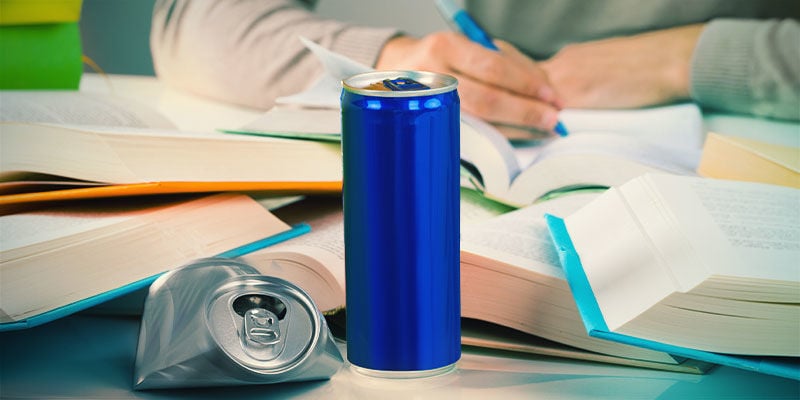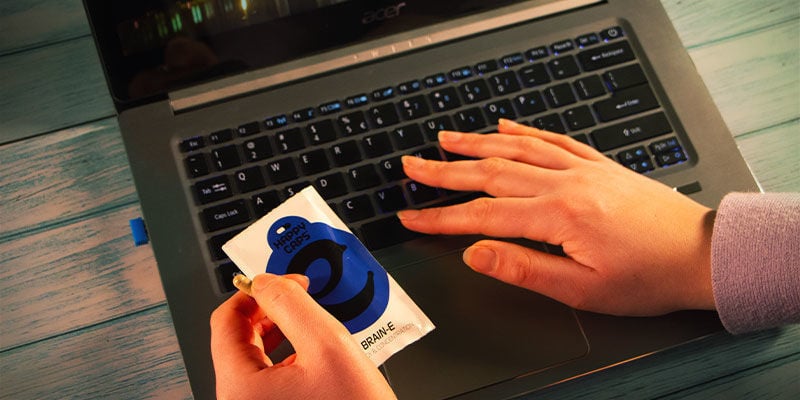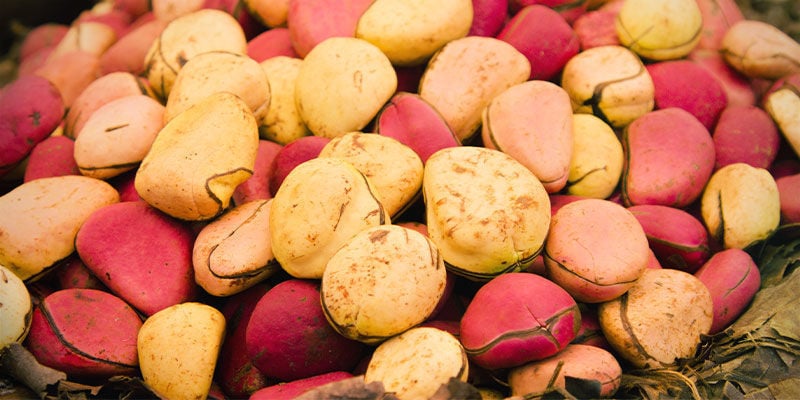
What Are The Effects Of Caffeine On Studying?
If you're wondering how to use caffeine to maximise your studying potential, then you've come to the right place! As with all drugs, there are optimal amounts that make good results more likely. Read on to get an explanation of how caffeine works, and how to get the very most out of it.
We all want to improve our concentration and focus when studying. Students in particular may find themselves needing to catch up on work, and a little assistance never goes amiss. Caffeine consumption as a study aid needs no introduction. However, it’s good to know how things work, and there absolutely are best practices regarding caffeine intake. Below, we outline the effects of caffeine, how to take it, and some alternatives for people who find caffeine just isn’t for them.
How Caffeine Works

Caffeine works by blocking the uptake of adenosine. Adenosine is a neurotransmitter responsible for making you feel tired. As you wake up in the morning, your body's enzymes will naturally begin metabolising adenosine, thus the feeling of becoming increasingly awake. As the day wears on, adenosine levels build up.
So, what does caffeine do? Essentially, caffeine blocks A1 receptors in the brain, which are responsible for uptaking adenosine. Therefore, your brain receives fewer signals to feel tired. But, how does it make you feel actively good? Well, caffeine also blocks A2A receptors. In doing so, it stimulates the production of dopamine and glutamate. These neurotransmitters have a positive, active effect on how you feel.
Combined, the two effects are the cause of long-lasting awareness and a stimulant “buzz”. However, by stimulating dopamine production, you can also build up a tolerance and addiction to caffeine.
Is Caffeine Good for Studying?

In short, yes. Caffeine, in doses between 40 and 300 milligrams, has a positive effect on low-level cognition: alertness, attention, and reaction time. Though higher-level cognition—judgement and decision-making—are less affected. Likewise, physical strength and endurance are greatly increased too (though this is unlikely to help you with studying).
Memory
The jury is out regarding the exact effects of caffeine on memory. It seems likely that caffeine affects long-term memory in a positive way, and it's even been studied for its potential to reduce the likelihood of neurological disorders. It's believed to do this by disrupting homeostasis in the brain, encouraging neurogenesis and neuroprotection.
It may be that short-term memory is bypassed when under the influence of caffeine. When this happens, memories may immediately be stored as long-term memories, making later recall significantly easier. If this is the case, then caffeine would certainly be a beneficial study drug. Presumably, though, in terms of memory function, it would be most effective if the learning was done prior to the time that recall was needed.
Energy Level
Energy level is significantly heightened by caffeine consumption. Adenosine is blocked and dopamine and glutamate are stimulated. The effect of these two processes means a large boost in energy. Combined with increased cognitive ability, this means individuals are potentially able to study more effectively, and for a longer period.
Focus

Whether focus is increased by caffeine intake is far more down to individual physiology than the aforementioned effects. In order to effectively focus, dopamine levels must sit within a very specific margin. For many people, these levels are adequate already, and caffeine intake will push dopamine levels too high, making concentration harder. However, some studies suggest that certain people, say those with ADHD (whose dopamine levels are too low), may in fact benefit from caffeine intake.
Among those who find themselves helped by caffeine, it may be that a gradually increasing dependence has pushed normal (without caffeine) dopamine levels to be unusually low. As a result, when someone uses caffeine, dopamine returns to normal levels, giving the impression that coffee is beneficial for concentration.
Does Caffeine Have Any Side Effects?

Caffeine, like all drugs, can have side effects. On average, between 200 and 400mg of caffeine is consumed per day. This amounts to 1 or 2 cups of coffee. Some people will experience side effects even in these amounts, especially if they are not used to caffeine. However, for most people, side effects are much more likely to occur when over 400 milligrams of caffeine is consumed. For heavy caffeine users, these numbers will be larger.
Too Much Caffeine
These are some of the possible effects of too much caffeine:
- Tension in head
- Jittery nerves
- Lightheadedness
- Shakes
- Trouble sleeping
- Racing heart or abnormal heartbeat
- Increase in blood pressure
- Dehydration
Not Enough Caffeine
This depends much more on the individual. There is no such thing as “not enough caffeine” for those without a dependence. However, for those who do have a caffeine dependence/tolerance, a dearth of caffeine can cause:
- Fatigue
- Low mood
- Tension in head
- Difficulty concentrating
- Upset stomach
- Muscle soreness
- Irritability
What Is the Best Source of Caffeine for Studying?

Caffeine is available in many forms—not just hot drinks. Different methods of ingestion have mildly different effects. So, while coffee may make someone shaky and uncomfortable, tea, for instance, may not. Ranging from organic nuts to pills, there are caffeine products for just about everyone.
Coffee and Tea
These are the classic methods of caffeine consumption, and have been around for thousands of years. Coffee is thought to have originated as a hardy bush in Ethiopia, where it spread into the Arab world.
Often, coffee tends to be very strong, with commensurate effects. Tea, on the other hand, is comparatively weak, and does not cause the same “buzz” associated with coffee.
Energy Drinks
Energy drinks are often high in caffeine and sugar. As a result, they can massively affect energy levels. This makes them effective studying tools, but also very open to dependence. As sugar is also highly addictive, the combination of sugar and caffeine in a single product is both a blessing and a curse.
Nootropic Stacks

Nootropic stacks are essentially bundles of nutrients designed to fine-tune and enhance cognitive ability. They are said to affect energy, mood, memory, and more. There are a huge number of things you can add to a nootropic stack, and caffeine is often an essential element. Whether consumed as part of food/drink or taken as a powder, caffeine will give your nootropic stack that edge.
-
Brain-E
Made from a mixture of choline, white willow bark extract, and caffeine, Brain-E pills are specifically crafted to give you an added dose of concentration. Ideally taken about 45 minutes before you begin your task, these little things will get your brain running that little bit smoother.
-
Clear Focus
Clear Focus is itself a nootropic stack. Made with a special balance of extracts, amino acids, and vitamins, regular use of Clear Focus will keep your brain ticking over, making every day rich and productive.
-
X-Fuel
X-Fuel is an all-natural supplement designed to give you an extra burst of energy just when you need it. Think of it as a perfectly balanced coffee in a pill, with a little bit of added goodness to really get your brain working.
Kola Nut
Kola nuts originate in Africa and are packed with caffeine. They were also used in the original Coca-Cola recipe, but they date back much further than that. Used ceremonially and holistically in Africa for thousands of years, they were first cultivated in Europe some time in the 17th century.
Yerba Mate
Yerba mate is full of caffeine and other beneficial vitamins. Used in traditional South American cultural practice, it has now become common among much of the world. Still, it is by far most commonly enjoyed in South America. Often shared, it has a rich heritage, and some claim it produces very "clean" effects.
Guarana
Guarana is a caffeinated powerhouse. Containing three times more caffeine than the coffee bean, this seed from South America is a favourite among caffeine aficionados. Famous for producing very strong effects without shakes and jitters, guarana is perfect for those who need a massive boost.
How To Use Caffeine To Help You Study

Caffeine is, for most, a great study tool. However, to get the most out of it, there are better and worse ways to use it. Below are some tips to optimise caffeine consumption for studying:
-
Take the right amount! Don’t overdo it; this will be counterproductive.
-
Drink 10–15 minutes prior to starting.
-
Or, take about 45 minutes before starting if in pill/capsule form.
-
Don’t take it after studying—you must allow your brain to rest.
-
Don’t develop a dependence; if you become dependent on caffeine, you will lose the benefits.
Using Caffeine During an Exam
Caffeine can also be useful in an exam setting, but it can’t replace hard work and preparation. A potent caffeinated drink will not imbue you with knowledge you never learned. However, if you’re well-prepared, this is how to get the most out of taking caffeine for an exam:
-
Less is more—too much will overstimulate your mind and concentration will become difficult.
-
Make sure you go to the toilet first!
-
Don’t stay up all night before, cramming and pounding down energy drinks. Good sleep is always better than loads of caffeine! Moreover, it’s long-term memory that is really benefited by caffeine, so cramming is no good for maximising efficiency anyway.
Are There Any Alternatives to Caffeine for Studying?

Some people just don’t like caffeine. But, there are alternatives that have similar effects:
-
Exercise: Increases energy levels and endorphins. As such, concentration, focus, and cognitive ability are all improved.
-
Dark chocolate: Releases serotonin, which increases energy and concentration as well as blood flow around the brain.
-
Take a break: Stepping away from your task is a great way to improve results. Not only does a break allow your mind to consolidate what it has learned, but giving it a rest allows it to refresh, meaning greater focus overall.
-
Sleep! It is hard to overstate how important this is. Sleep is the time during which your brain properly burns memory into itself. Without adequate sleep, you will notice very limited benefits with all of these methods. Indeed, good sleep is better than any alternative. Make sure you rest; your brain will function optimally if you do!
- (2016/12/01). A review of caffeine’s effects on cognitive, physical and occupational performance - ScienceDirect - https://www.sciencedirect.com
- (n.d.). How Does Caffeine Affect ADHD - https://www.healthline.com
- Simone Cappelletti, Piacentino Daria, Gabriele Sani, & Mariarosaria Aromatario. (2015, January). Caffeine: Cognitive and Physical Performance Enhancer or Psychoactive Drug? - https://www.ncbi.nlm.nih.gov
-
 4 min
18 April 2021
How To Combine CBD Oil With Coffee
CBD and caffeine are two intriguing substances with unique effects and benefits. Here's what happens when you combine them.
4 min
18 April 2021
How To Combine CBD Oil With Coffee
CBD and caffeine are two intriguing substances with unique effects and benefits. Here's what happens when you combine them.
-
 5 min
25 July 2019
The Best Alternatives To Coffee: Natural Ways To Boost Energy
Although it may be hard to believe, not everybody is a fan of coffee. In case you happen to be one of those people, here is a list of perfect alternatives to the famous caffeinated beverage. Some...
5 min
25 July 2019
The Best Alternatives To Coffee: Natural Ways To Boost Energy
Although it may be hard to believe, not everybody is a fan of coffee. In case you happen to be one of those people, here is a list of perfect alternatives to the famous caffeinated beverage. Some...
-
 5 min
10 February 2018
Combining Cannabis And Coffee: Where To Begin?
Those looking for a different way to start their day should pay close attention. The combination of cannabis and coffee has long been a talking point. On the surface, both offer opposite effects,...
5 min
10 February 2018
Combining Cannabis And Coffee: Where To Begin?
Those looking for a different way to start their day should pay close attention. The combination of cannabis and coffee has long been a talking point. On the surface, both offer opposite effects,...
-
 4 min
11 August 2017
The Pros (And Cons) Of Using Cannabis For Studying Or Training
Cannabis use has long been assumed to sustain negative effects on memory, learning and mental performance. However, recent findings prove that this is not always the case. Many individuals actually...
4 min
11 August 2017
The Pros (And Cons) Of Using Cannabis For Studying Or Training
Cannabis use has long been assumed to sustain negative effects on memory, learning and mental performance. However, recent findings prove that this is not always the case. Many individuals actually...
-
 2 min
3 May 2017
7 Cannabis Strains Ideal For Boosting Motivation And...
Sativa strains of cannabis contain a high content of cannabinoids that can actually give you more energy and clear the fog from your eyes. Whether you just need a pick-me-up or you suffer with...
2 min
3 May 2017
7 Cannabis Strains Ideal For Boosting Motivation And...
Sativa strains of cannabis contain a high content of cannabinoids that can actually give you more energy and clear the fog from your eyes. Whether you just need a pick-me-up or you suffer with...
-
 1 min
17 June 2016
Yerba Maté Vs. Coffee: Should You Make The Switch?
We love coffee due to its stimulating abilities. However, coffee often brings with it some negatives. Yerba Maté can be a great alternative. Find out about Yerba Maté and how it compares to coffee.
1 min
17 June 2016
Yerba Maté Vs. Coffee: Should You Make The Switch?
We love coffee due to its stimulating abilities. However, coffee often brings with it some negatives. Yerba Maté can be a great alternative. Find out about Yerba Maté and how it compares to coffee.





 United States
United States












